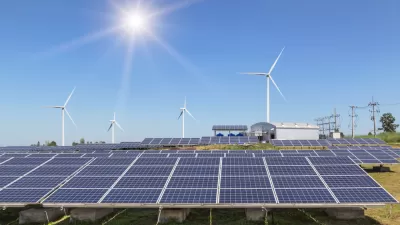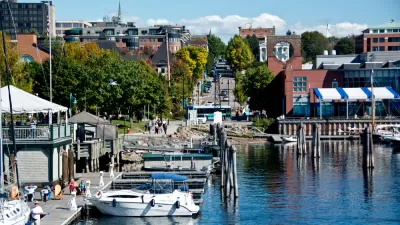Talk about bringing power to the people: eight regional governments in California are in various stages of adopting "community choice" utilities to buy power from the grid in the hopes of cleaning up their energy portfolio.
"From Silicon Valley to the East Bay to the Central Coast, a "people's power" movement is sweeping through California that will give local residents a choice to ditch PG&E and buy cleaner -- and possibly cheaper -- energy from the cities and counties where they live," reports Tracy Seipel.
Specifically, Seipel is referring to "community choice" utilities, currently place in three counties around the state but under consideration for many more. Seipel explains more about how the community choice utilities operate:
"Overseen by a team of energy experts and a board of elected officials, new community-run utilities are buying power from the grid, procuring a higher percentage of renewable energy -- think solar and wind, as well as methane from dairy cows -- than PG&E, while aiming for a price around or even below the giant utility's rates. The new power systems also are charged with developing more local renewable energy."
Seipel also sums up the political debate surrounding the idea, noting that critics of the arrangement call community choice "a feel-good solution that will lead to unstable prices, empty promises and -- at least for the time being -- no additional green energy."
The remainder of the article focuses on the fortunes of the community choice utilities so far, as well as insight into the slightly esoteric but still critical matter of the "exit fee" that determines how expensive the model is in any given month.
FULL STORY: Bay Area communities gearing up to create their own power systems

Maui's Vacation Rental Debate Turns Ugly
Verbal attacks, misinformation campaigns and fistfights plague a high-stakes debate to convert thousands of vacation rentals into long-term housing.

Planetizen Federal Action Tracker
A weekly monitor of how Trump’s orders and actions are impacting planners and planning in America.

San Francisco Suspends Traffic Calming Amidst Record Deaths
Citing “a challenging fiscal landscape,” the city will cease the program on the heels of 42 traffic deaths, including 24 pedestrians.

Defunct Pittsburgh Power Plant to Become Residential Tower
A decommissioned steam heat plant will be redeveloped into almost 100 affordable housing units.

Trump Prompts Restructuring of Transportation Research Board in “Unprecedented Overreach”
The TRB has eliminated more than half of its committees including those focused on climate, equity, and cities.

Amtrak Rolls Out New Orleans to Alabama “Mardi Gras” Train
The new service will operate morning and evening departures between Mobile and New Orleans.
Urban Design for Planners 1: Software Tools
This six-course series explores essential urban design concepts using open source software and equips planners with the tools they need to participate fully in the urban design process.
Planning for Universal Design
Learn the tools for implementing Universal Design in planning regulations.
Heyer Gruel & Associates PA
JM Goldson LLC
Custer County Colorado
City of Camden Redevelopment Agency
City of Astoria
Transportation Research & Education Center (TREC) at Portland State University
Jefferson Parish Government
Camden Redevelopment Agency
City of Claremont





























